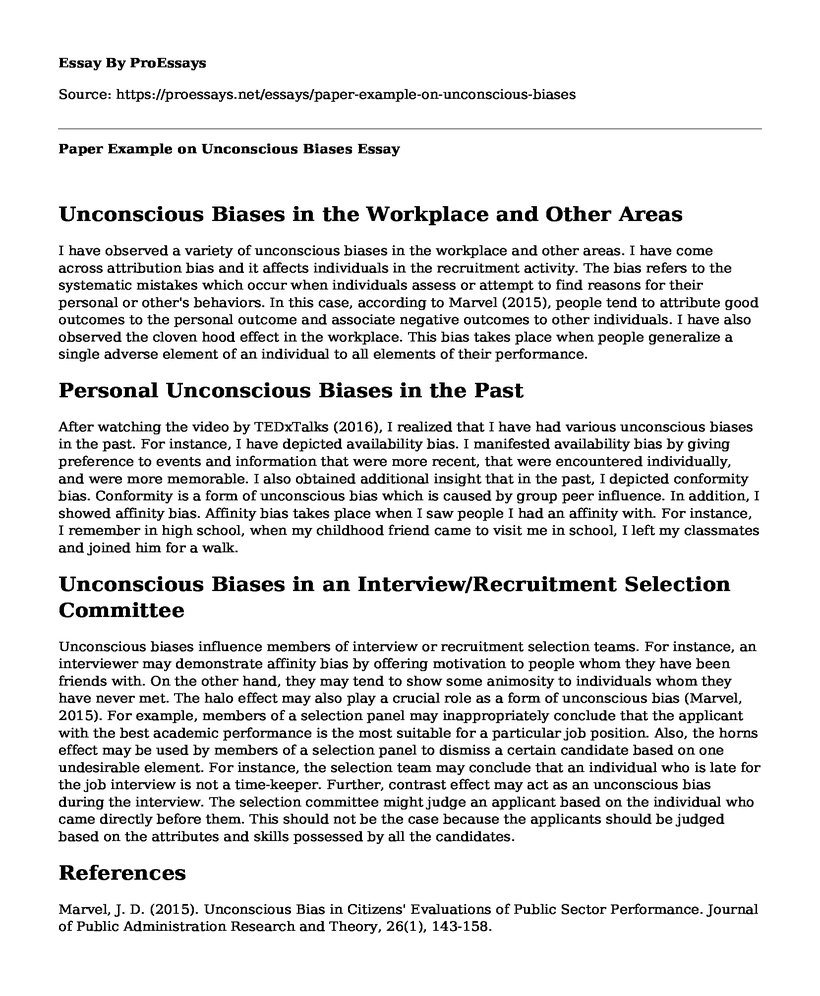Unconscious Biases in the Workplace and Other Areas
I have observed a variety of unconscious biases in the workplace and other areas. I have come across attribution bias and it affects individuals in the recruitment activity. The bias refers to the systematic mistakes which occur when individuals assess or attempt to find reasons for their personal or other's behaviors. In this case, according to Marvel (2015), people tend to attribute good outcomes to the personal outcome and associate negative outcomes to other individuals. I have also observed the cloven hood effect in the workplace. This bias takes place when people generalize a single adverse element of an individual to all elements of their performance.
Personal Unconscious Biases in the Past
After watching the video by TEDxTalks (2016), I realized that I have had various unconscious biases in the past. For instance, I have depicted availability bias. I manifested availability bias by giving preference to events and information that were more recent, that were encountered individually, and were more memorable. I also obtained additional insight that in the past, I depicted conformity bias. Conformity is a form of unconscious bias which is caused by group peer influence. In addition, I showed affinity bias. Affinity bias takes place when I saw people I had an affinity with. For instance, I remember in high school, when my childhood friend came to visit me in school, I left my classmates and joined him for a walk.
Unconscious Biases in an Interview/Recruitment Selection Committee
Unconscious biases influence members of interview or recruitment selection teams. For instance, an interviewer may demonstrate affinity bias by offering motivation to people whom they have been friends with. On the other hand, they may tend to show some animosity to individuals whom they have never met. The halo effect may also play a crucial role as a form of unconscious bias (Marvel, 2015). For example, members of a selection panel may inappropriately conclude that the applicant with the best academic performance is the most suitable for a particular job position. Also, the horns effect may be used by members of a selection panel to dismiss a certain candidate based on one undesirable element. For instance, the selection team may conclude that an individual who is late for the job interview is not a time-keeper. Further, contrast effect may act as an unconscious bias during the interview. The selection committee might judge an applicant based on the individual who came directly before them. This should not be the case because the applicants should be judged based on the attributes and skills possessed by all the candidates.
References
Marvel, J. D. (2015). Unconscious Bias in Citizens' Evaluations of Public Sector Performance. Journal of Public Administration Research and Theory, 26(1), 143-158.
TEDxBasel. (2016, August 30). Are you biased? I am | Kristen Pressner | TEDxBasel. Retrieved March 24, 2018, from https://www.youtube.com/watch?v=Bq_xYSOZrgU. (2016, August 30). Are you biased? I am | Kristen Pressner | TEDxBasel. Retrieved March 24, 2018, from https://www.youtube.com/watch?v=Bq_xYSOZrgU
Cite this page
Paper Example on Unconscious Biases. (2022, Apr 12). Retrieved from https://proessays.net/essays/paper-example-on-unconscious-biases
If you are the original author of this essay and no longer wish to have it published on the ProEssays website, please click below to request its removal:
- The Single-Sex High School as a Feature of Secondary Education Has Lost Its Relevance - Argumentative Essay
- A Discussion on Homophobia and Its Impact on Gender Equality Essay
- Shelter for Abused Women Essay Example
- Essay on Weight Loss Intervention for Obese and Overweight Children and Adolescents
- Serial Sexual Homicide: Compulsion, Deviance, & Ted Bundy - Annotated Bibliography
- Wal-Mart Discriminates Against Women: Facts & Evidence - Essay Sample
- Essay Example on Battered Woman Defense and Social Issues







